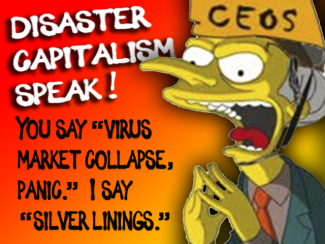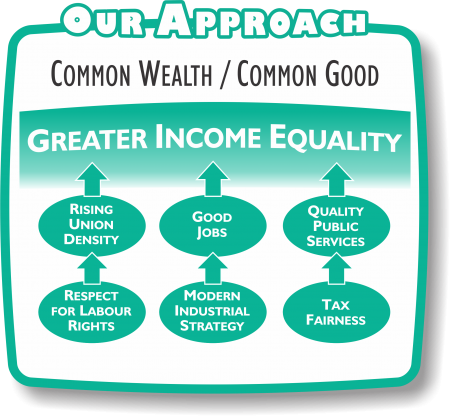DEJA VOODOO
We can’t let 2020 be 2008 all over again

CORPORATIONS LOVE A GOOD DISASTER. The corona virus pandemic already has many of them licking their chops over all the opportunities they will likely get to shovel our money into their pockets again—with good reason. Think about how they cleaned up in the economic meltdown they delivered in 2008.
In Canada federal government support for Canadian banks peaked at $114 billion, in March 2019. That works out to a donation of $3,400 to the banks from each and every man, woman and child in Canada.
Three of Canada’s banks (CIBC, BMO, and Scotiabank) were at some point completely under water during the crisis, with government support exceeding the total value of the bank. It would have cost us less to buy the banks outright rather than bail them out. But our government didn’t.
Not one Canadian bank lost money during the 2008 crisis. The money we fronted them let them keep going and rake in $27 billion in total profits from 2008 to 2010.
There was never any direct payment to Canadians to cover their individual losses.
Once burned...
We can’t get burned that way again. We have to protect ourselves: first, from the virus itself; second, from getting stuck with the bill for fighting it.
Each one of us must support the social isolation and working from home and closing the schools and all the other things that the health experts tell us to do to prevent the spread of the Covid 19 virus.
But what about all of us who did what we were asked to do to defeat the virus. What about all of us who didn’t go to work and didn’t get paid—the millions of us who work in retail and the service sector? What about all those gig workers out there? Who’s going to pay our bills if we’re off work or worse, get sick and have to be quarantined?
All the “too big to fail crowd” (the airlines and the oil and gas sector and even the Retail Council and the Independent Business lobby) all have their hands out already. That billion dollars that PMJT promised won’t go very far after those guys get their hooks into it. That’s what happened the last time we had an economic crisis.
No, wait, that’s what happens every time we have any kind of crisis.
This time it has to be different. This time we must put money directly into the pockets of all us everyday folks who got left short because we did what we were asked to do to fight the virus. This time, when payback for doing the right thing comes, we deserve to be first in line.
What he said
Tim Bousquet had a great take on all this in the March 16 edition of the online newspaper, the Halifax Examiner. He wrote:
Let’s think through what this Covid crisis will mean. In terms of businesses, for example, you have a restaurant that ... goes bankrupt, but the assets of the company are fine — the kitchen is still there, the tables, the chairs, etc.In normal times, that would all be sold as an asset sale, but this crisis magnifies the problem by a gazillion, and it’s very possible that the ownership of everything will end up in the hands of the already extremely wealthy. It’s Disaster Capitalism on steroids.
We need to recognize that this is not just normal business failure, but something unique, and we have to plan for a major reset. ...[B]etter days will come.... We should figure out how to arrange it so that at that point, people are returned whole again.
That means that that bankrupt restaurant company can be resurrected and the assets returned to it, with new operating capital supplied. Same with just normal people: simply give them money.
During and after the 2008/09 financial crisis, western governments had large stimulus programs, with deficit spending that all went to government expenses to hire businesses (and of course to bail out the banks), a top-down approach. We’re going to need something much larger, orders of magnitude larger, but a bottom-up approach, giving people cash directly, resurrecting small businesses when the time comes, like that.
We can’t let a health calamity be echoed by an economic calamity
- 30 -













Add new comment